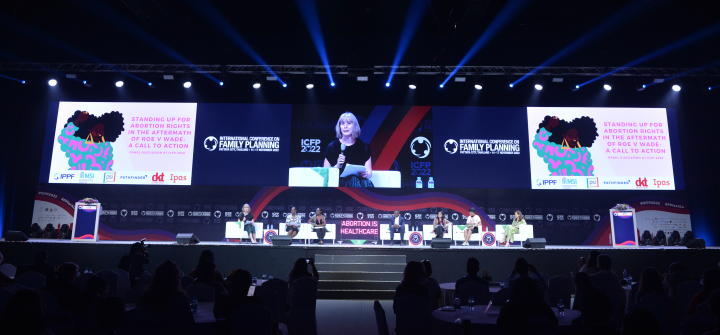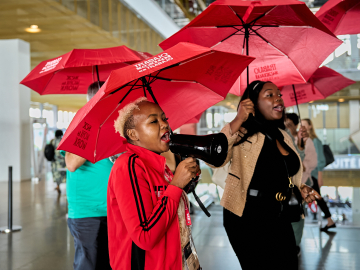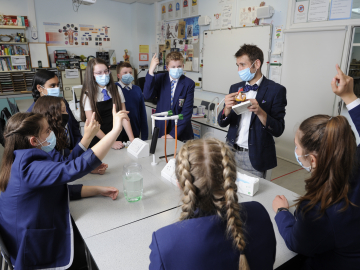What the Fall of Roe vs. Wade Means for the Rest of the World
PATTAYA, THAILAND—Questions surrounding how the fall of Roe v. Wade in the US could affect vulnerable people in other countries around the world featured heavily among the family planning advocates, researchers, and providers gathered for this week’s International Conference on Family Planning—with some sharing that they are already seeing some shifts driven by emboldened abortion rights opponents.
And as with so many other struggles, they worry that women and girls in poor countries stand to lose the most.
The reality is that there are 25 million unsafe abortions each year—and the overwhelming majority of unsafe abortions happen to women and girls in poor countries, PSI senior clinical advisor for Africa Milly Kaggwa, MD, said at a press conference following a plenary session on Wednesday titled “Standing up for abortion rights in the aftermath of Roe v. Wade.”
“We knew it was coming. We knew it had been coming for a long time,” Anu Kumar, PhD, MPH, president and CEO of Ipas, said of the US Supreme Court ruling last June that erased protections for abortion rights for Americans. “This is frankly just another brick in the wall that anti-rights actors are building to contain and silence women, LGBTQ people, black and brown people—and there’s a global ripple effect,” she said.
Kumar also pointed out that the US is out of step with much of the rest of the world in restricting legal grounds for abortion that dozens of other countries are at work to expand. In Latin America, countries including Mexico, Argentina, and Colombia have all moved to expand rights; in Africa, just this week, Benin moved to expand protections for abortion care as well.
The restrictions are out of step with a majority of Americans, too. According to Ipas research, 9 out of 10 Americans do not support a ban on abortion, Kumar noted. Regardless, Kumar said, “We know the opposition is emboldened and they’re using it as an excuse to undermine decades-long efforts.”
Namakando Simamuna, a policy and advocacy officer for MSI Reproductive Choices shared what that looks like in her country, Zambia. “We’ve seen a rise in anti-choice activities characterized by misinformation, and attempts to roll back positive policy wins. As we work on the frontlines of service delivery, we see how this affects access and understand how this eventually leads to a rise in maternal mortality … how the legal and policy restrictions marginalize women and girls and create vulnerabilities and dips in quality and access.”
In contrast, Simamuna said, countries where MSI works that loosened abortion restrictions saw dramatic improvements—such as Nepal, which saw up to a 50% decline in maternal mortality after abortion laws were liberalized.
Another panelist, Mara Royo, the executive director of IPPF’s Colombia Member Association, ProFamilia, pointed out that even when rights are protected legally, there are many forces at work that obstruct access to reproductive health care.
In Colombia, despite legal protections, there are challenges to access, as the country is suffering from a great deal of violence and upheaval. “Last year, there were 100,000 adolescent pregnancies, of which 34% were children below the age of 14. That’s rape in Colombia. We also have in the last 6 months 15,800 cases of reported sexual abuse in girls below the age of 15,” Royo said; providing access to “timely, quality, abortion, in the middle of this violence has become really hard.”
Panelists expressed grave concern for other countries in the Latin America region—especially Nicaragua, El Salvador, and Honduras, which already punish providers and recipients of abortion care with prison time; Royo said the rulers in these countries may see the rollback of rights in the US as a “green light” to further degrade human rights for the most vulnerable.
Countries that receive US foreign aid also face heightened challenges to access, according to Angela Akol, Ipas Africa’s clinical director, who said that Kenya and other African countries are already seeing opposition forces targeting not only abortion rights, but comprehensive sexuality education and LGBTQ rights.
Beth Schlachter, the International Planned Parenthood Foundation’s interim director of global advocacy and US representative, warned that the same actors opposing abortion rights are also targeting efforts to provide contraception: “Because contraception is honestly about freedom, and they’re ultimately against the freedom of women, children, poor people, people of color, and they are invested in their own power. If we don’t look at contraception and abortion as an issue of power, then we’re going to be missing the larger picture and we’re fighting the wrong battle,” she said.
But in terms of finding solutions, Schlachter suggested trying to advance a “values-based conversation around wellbeing and intentions,” and trying to get past labels and words—such as comprehensive sexuality education, pro-choice, pro-abortion—that tend to push “everyone’s walls to come up one way or another.” Instead, she suggests seeking out common ground in our shared human values, our desire to care for people—including the needs of a 14 year-old child who is pregnant—and “bring that understanding to policies and legislation, and care and services, in a way that ultimately provides for the wellbeing of all of us.”
Beth Schlachter addresses a crowd at an ICFP 2022 session on abortion rights in Pattaya, Thailand, November 16, 2022. Image courtesy of ICFP 2022.





